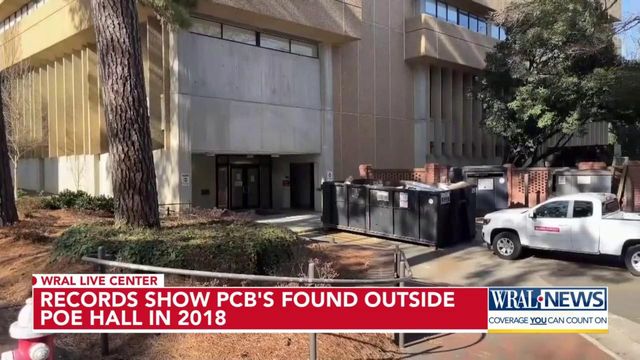NC State's Poe Hall tested positive for PCBs as far back as 2018
Records released to 5 On Your Side by North Carolina State University reveal that tests showed the presence of PCBs – categorized as "probably carcinogenic to humans" – at Poe Hall in 2018. The presence of PCBs was detected in the caulking of the building's exterior.
According to the 2018 report from Matrix Health & Safety Consultants, LLC, caulk samples collected on the exterior of Poe Hall showed PCB levels up to 17,000 parts per million (ppm). PCBs in excess of 50 ppm are considered hazardous special waste according to the EPA. The report continues, noting that leaching of PCBs into the surrounding substrates, or layers, is a possibility.
WRAL asked NC State if additional interior testing was conducted in 2018 in light of the detection of PCBs in the exterior caulking.
“To our knowledge, no health concerns were expressed related to the renovation and there was no indication from consultants doing the outdoor testing that indoor testing was needed,” said Mary Cole Pike, a spokesperson for NC State, in response to the question.
In a statement, Vice Chancellor Warwick Arden informed some NC State employees that the 2018 testing was part of a waterproofing project and standard practice.
"The scope of the renovation project included caulk replacement around windows and doors and around vertical and horizontal facades in both locations," Arden wrote.
It remains unclear whether all the caulking was removed or replaced.
5 On Your Side received the 2018 testing report after asking for all PCB testing results connected to Poe Hall since January 1, 2013. This was the only document returned for that request indicating that the university did not do any further testing for PCBs at Poe Hall.
NC State says 2018 testing differs in nature from testing prompted by health concerns
The revelation of the 2018 test contradicts NC State’s previous statement that it had not tested Poe Hall for PCBs before 2023. When asked about this, NC State responded saying it had never done comprehensive environmental testing for PCBs inside Poe Hall prior to 2023.
Here is the full response to the question:
“We’ve never done comprehensive environmental testing for PCBs inside Poe Hall prior to 2023 – this information does not contradict that. The questions in August 2023 that led to the testing for PCBs inside Poe Hall are unrelated to the routine exterior maintenance project in 2018."
High levels of PCBs found in Poe Hall in 2023
In October 2023, PCBs were found during testing inside the building, which was home to NC State's College of Education and Department of Psychology. In November, the building was closed for further environmental testing.
Since then, over 150 people have come forward to WRAL 5 On Your Side, reporting cases of cancer or other serious illnesses.
It’s important to note that the types of PCBs found on the outside of Poe in 2018 – Aroclor 1254 and Aroclor 1268 – are not the same as what was found inside the building which was Aroclor 1262.
WRAL has documents outlining complaints about the air quality in Poe Hall dating as far back as 2010. In Tuesday’s statement, Arden detailed a 2022 presentation on the building’s HVAC system. However, he clarified that the university did not test for PCBs.
The details of the 2022 presentation and the results of prior PCB testing are part of numerous public records requests WRAL has filed with the university to comprehend the events leading up to the closure of Poe Hall and reports of cancer.
NC State has contracted with Geosyntec Consultants to do an environmental assessment of the building.
The first round of results, released on Feb. 8, 2024, found just one instance of PCBs above acceptable levels in 81 samples. Dr. David Carpenter, a professor at the State University of New York at Albany whose work focuses on the study of environmental causes of human disease, told WRAL News that the fact that Poe Hall's HVAC system has been off since November distorts the view of what's going on.
NC State has also released more health information on its Poe Hall updates page. The lack of health information is something 5 On Your Side has reported on extensively.
The next phase of testing is expected to begin in March, but according to the university, "analysis and reporting could take months."
The building will remain closed through at least Dec. 31, 2024. Classes and offices have been relocated.













